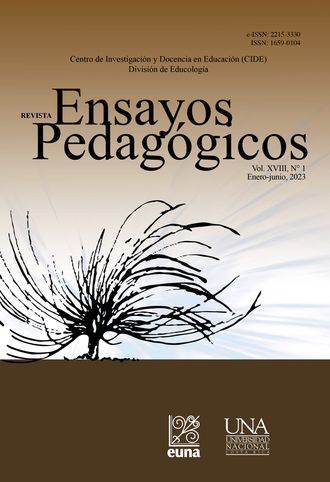The Importance of Nonnative English Teachers in Costa Rica
DOI:
https://doi.org/10.15359/rep.18-1.16Palabras clave:
Costa Rica, English teaching, needs, NESTs, NNESTs, skills, strategiesResumen
In Costa Rican society, learning English has become a valuable tool to increase job opportunities, which has caused more hiring of teachers of this language. However, some institutions manifest preferences toward native teachers being perceived as the ideal tutor with a target model for language learning. Unfortunately, this causes nonnative English teachers (NNESTs) to suffer from discrimination when they are compared to native English teachers (NESTs). This paper aims to raise awareness in society to consider teachers´ competences and qualities when choosing an English educator because teaching requires more than having a high level in the use of the language. In this literature review, it will be able to recognize the benefits of learning English from NNESTs. Additionally, the analysis of related research was used to exemplify some reasons to qualify NNESTs as educators with sufficient competencies to teach. The results from the literature review suggest that NNESTs are more aware of the students’ needs and the importance of providing feedback. Being in the same position as most of their learners allows them to previously recognize the difficulties when learning English. Sharing students’ cultural backgrounds permits NNESTs to teach and guide students regarding their functions as individuals in society
Referencias
Aguilar-Sánchez, J. (2005). English in Costa Rica. World Englishes, 24(2), 161–172. https://doi.org/10.1111/j.1467-971X.2005.00401.x
Alpizar, D. (2016). Tips for TOEIC candidates. Proceedings of the II English Teaching Congress, Huetar Norte Region (pp. 36-41).
Alseweed, M. A. (2012). University students’ perceptions of the influence of native and non- native teachers. English Language Teaching, 5(12), 42-53.
Atay, D., Kurt, G. , Çambilen, Z., Ersin, P., & Kaslioglu, O. (2009). The role of intercultural competence in foreign language teaching. Inonu University Journal of The Faculty of Education, 10(3), 123-135.
Bayyurt, Y. (2006). Non-native English language teachers’ perspective on culture in English as a Foreign Language classrooms. Teacher Development, 10(2), 233–247.
Chaves-Fernández, L., Rojas-Cerdas, D., & Chaves-Carballo, O. (2015). El efecto de la calidad en un programa de estudio acreditados: caso del bachillerato en la enseñanza del inglés en la universidad nacional, Costa Rica. [The effect of the quality of an accredited study program: The case of the bachelor’s in English teaching at Universidad Nacional, Costa Rica]. Revista Calidad en la Educación Superior, 6(2), 179-199.
Chun, S. Y. (2014). EFL learners’ beliefs about native and non-native English-speaking teachers: perceived strengths, weaknesses, and preferences. Journal of Multilingual and Multicultural Development, 35(6), 563–579.
Córdoba, P., Coto, R., & Ramírez, M. (2005). La enseñanza del inglés en Costa Rica y la destreza auditiva en el aula desde una perspectiva histórica. [The teaching of English in Costa Rica and listening skills in the classroom from a historical perspective]. Revista Actualidades Investigativas en Educación, 5(2), 1-12.
Florence Ma, L. P. (2012). Advantages and Disadvantages of Native- and Nonnative-English-speaking Teachers: Student Perceptions in Hong Kong. TESOL Quarterly, 46(2), 280-305.
Galloway, N. (2013). Global Englishes and English Language Teaching (ELT) – Bridging the gap between theory and practice in a Japanese context. System, 41(3), 786–803. https://doi.org/10.1016/j.system.2013.07.019
Gülhanım, U . (2018). A study on the importance of learning styles in foreign language teaching. International Journal of Languages’ Education and Teaching, 6(2),184- 191.
Hinkel, E. (2006). Current perspectives on teaching the four skills. TESOL Quarterly, 40(1), 109-135.
Inbar-Lourie, O., & Donitsa-Schmidt, S. (2019). EMI Lecturers in international universities: is a native/non-native English-speaking background relevant?. International Journal of Bilingual Education and Bilingualism, 23(3), 1–13.
Jiménez, R. T., & Rose, B. C. (2010). Knowing how to know: building meaningful relationships through instruction that meets the deeds of students learning English. Journal of Teacher Education, 61(5), 403-412.
Kurniawati, K., & Rizki, D. (2018). Native vs. non-native EFL teacher: Who are better? Studies in English Language and Education, 5(1), 137-147. https://doi.org/10.24815/siele.v5i1.9432
Lasagabaster, D., & Sierra, J. M. (2005). What do students think about the pros and cons of having a native speaker teacher? In E. Llurda (Ed.), Non-Native Language Teachers, Educational Linguistics (vol. 5, pp. 217–241). Springer. https://doi.org/10.1007/0-387-24565-0_12
Lasagabaster, D., & Sierra, J. M. (2002). University students’ perceptions of native and non- native speaker teachers of English. Language Awareness, 11(2), 132–142.
León, G. (2021). The role of non-native English teachers (NNETs) within the English-learning process. In J. P. Zúñiga & J. I. Barrantes (Eds.), English Language Teaching in Costa Rica: Reflections on Emergent Challenges (pp. 23-32). División de Educología de la Universidad Nacional, Costa Rica.
Llurda, E. (2004). Non-native-speaker teachers and English as an International Language. International Journal of Applied Linguistics, 14(3), 314–323. https://doi.org/10.1111/j.1473-4192.2004.00068.x
Mahboob, A. (2004). Native or nonnative: What do students enrolled in an intensive English program think? In L. KammhiStein (Ed.), Learning and teaching from experience: Perspective on nonnative English speaking professionals (pp. 121-147). University of Michigan Press. https://doi.org/10.3998/mpub.9648
Mede, E., Cosgun, G., & Atay, D. (2017). The use of speaking techniques by Native and Non-Native English instructors: A case in Turkey. International Journal of Learning and Teaching, 9(4), 411–417.
MEP. (2016). Programas de estudio de ingés: tercer ciclo y educación diversificada. Ministerio de Educación Pública. https://www.mep.go.cr/sites/default/files/programadeestudio/programas/ingles3ciclo_diversificada.pdf
MEP. (2020). Curriculum conversational English. Ministerio de Educación Pública.
Moore, S., & Kuol, N. (2005). Students evaluating teachers: exploring the importance of faculty reaction to feedback on teaching. Teaching in Higher Education, 10(1), 57– 73.
Önalan, O. (2018). Non-Native English Teachers’ Beliefs on Grammar Instruction. English Language Teaching, 11(5), 1-13. http://doi.org/10.5539/elt.v11n5p1
Rao, Z., & Chen, H. (2019). Teachers’ perceptions of difficulties in team teaching between local- and native-English-speaking teachers in EFL teaching. Journal of Multilingual and Multicultural Development, 41(4), 1-15.
Soares, D. F. (2015). The Relationship between teachers and students in the classroom: communicative language teaching approach and cooperative learning strategy to improve learning [Master’s thesis, Bridgewater State University]. Portal do Conhecimento de Cabo Verde.
Tosuncuoglu, I. ( 2017). Non-native & native English teachers. Journal of History Culture and Art Research, 6(6), 634-638.
Villalobos, N. (2011). Notions of non-native teachers in Costa Rican language schools [Paper Presentation] Memoria del III Congreso Internacional de Lingüística Aplicada, Heredia, Costa Rica. https://repositorio.una.ac.cr/bitstream/handle/11056/19754/notionnonnativeteachers_%20nvillalobos.pdf?sequence=1&isAllowed=y
Walkinshaw, I., & Oanh, D. H. (2014). Native and Non-Native English language teachers: Student perceptions in Vietnam and Japan. SAGE Open, 4(2), 1-9.
Watson, R., & Pojanapunya, P. (2008). Implicit attitudes towards native and non-native speaker teachers. System, 37(1), 23-33.
Youn-Hee, K. (2009). An investigation into native and non-native teachers’ judgments of oral English performance: A mixed methods approach. Language Testing, 26(2), 187–217.
Zuparova, S., Shegay, A., & Orazova, Z. (2020). Approaches to learning English as the source of all subjects. European Journal of Research and Reflection in Educational Sciences, 8(6), 102-107.
Publicado
Cómo citar
Número
Sección
Licencia
La Revista Ensayos Pedagógicos está suscrita a la Licencia Creative Commons Atribución-NoComercial-SinDerivadas 4.0 Internacional, lo cual implica la posibilidad de que tanto las personas autoras como las personas lectoras puedan, de forma gratuita, descargar, almacenar, copiar y distribuir la versión final aprobada y publicada (post print) del artículo, siempre y cuando se realice sin fines comerciales, no se generen obras derivadas y se mencione la fuente y autoría de la obra. Asimismo, la Revista Ensayos Pedagógicos declara que toda persona autora conservará a perpetuidad los derechos de autoría de su ensayo o artículo.









